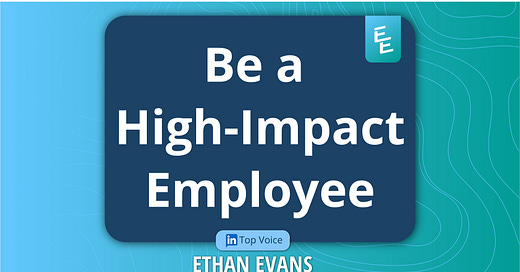Welcome to a paid member-only edition of Level Up: Your source for career growth solutions & community by retired Amazon Vice President, Ethan Evans. If you’d like to become a paid member, see the benefits here, and feel free to use this expense template to ask your manager.
We have released three new Career Talks classes. While these classes are available for purchase individually, they are free to paid newsletter subscribers:
How to Get Your Ideas Heard
Executive 1:1s - Using Them Well
How Being Unreasonable Drove Me to Amazon VP - Make Your Mark
View the Career Talks class catalog.
Existing paid newsletter subscriber class access code instructions.
The next Career Talks class will be presented live to paid subscribers and include live Q&A.
High-impact employees understand what their manager, group, and company are trying to accomplish.
For your manager to see you as “high impact,” you must do the work they value the most.
To do this, you can ask your manager about their priorities, but you should also work to understand them as well as the goals of the group and the company. This way, you can maximize what you are doing in terms of what creates the most value.
To understand what work is most valuable, work from the outside in and from big to small.
Start with your company
At most companies, the mission is to make money.
So, to figure out what work is most valuable, ask yourself where you and your team’s work fits into that mission. Which of your current activities best helps the company make or sell more products, or to reduce expenses? The more your personal work positively impacts the mission, the more high-performing you are as an employee.
As a counter-example, consider some mission non-critical services that most companies outsource. We all need a clean place to work, but most companies hire a janitorial service because keeping the offices tidy is not core to the mission. By comparison, most companies hire salespeople to either directly sell their products or to choose and manage the relationships with whoever sells them. Selling the product or service is where the hard work turns into money, so most companies consider it too essential to let anyone else do.
After you are clear on the business mission, consider your team. If a company contains more than a few people, the employees are normally divided into teams. Your team name and goals should give you a good idea of what the company is expecting from the team, and you want to be doing the work that most directly accomplishes those goals. Conversely, you want to avoid activities that are distracting or low value in relation to the goals.
A colleague of mine at Amazon once demonstrated this clarity and commitment to his team’s mission perfectly. He was responsible for driving up the sales of paperback fiction on the Amazon website, and he was very successful at it. That side of the business was growing rapidly as a direct result of him and his team. One day, an executive above him asked him to prepare a time-consuming and complicated report that my colleague saw as distracting and low-value.
He responded to the executive’s email saying: “I’m busy making us money. I’m not going to stop doing that to write this report.”
He didn’t hear back about the report.
Because he WAS making a lot of money for the business, he was able to reject low-value work. Even from an executive above him.
Once you have understood your company’s mission (where they make money) and identified how your team fits into these goals, it is time to study your manager.
Ask yourself the following questions:
What has your manager said or written about the group’s goals?
What do they most often talk about? What do they praise in others?
Your manager’s actions often reveal more about their priorities than their words. Where are they spending their time?
Which parts of your work does your manager ask you about or seem to care most about?
Which parts of your work take up time but don’t seem to interest your manager? What do they never ask about or only notice when there is a major problem?
Does your manager have a pet project or a goal that clearly excites them? Do they have work in their team that they tend to avoid? Managers are human beings, and we all have preferences for certain types of work. Often, a manager is not perfectly aligned with the company and group goals, so they may value and reward some work more than others based on their personality.
Once you have “done your homework” and studied your company, your team, and your manager, the last step is to simply ask your manager about their top goals or priorities.
To do this, say:
“I want to make sure that I am prioritizing the most important work to help you and the team. Would you please remind me of your top few priorities for the team?”
No one is going to disagree with you prioritizing the most important work to help them, so they will be quick to tell you what matters to them.
Once you know what matters to them, you have to work on it.
This is easier said than done.
How to Do The Work Your Manager Values
It is common to hear that someone has worked all day and never managed to get to the most important work.





